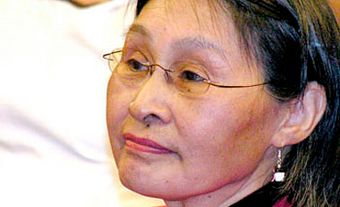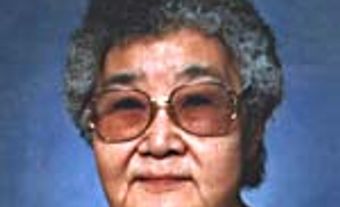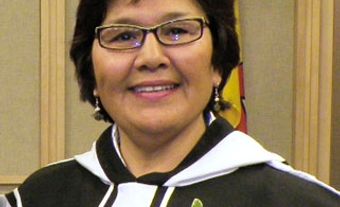
Early Life
Piita Irniq grew up in the traditional Inuit way, trapping, hunting and living off the land. Irniq and his family lived in igloos in the winter and tents in the summer (see Architectural History: Indigenous Peoples). They travelled by dogsled and spoke Inuktitut.
Irniq recalls his parents being told by missionaries in 1958 that he would have to go away to school. Without any prior consultation, Irniq and other local children were sent off to residential school.
Residential School
Piita Irniq went to Sir Joseph Bernier Federal Day School in Chesterfield Inlet, Northwest Territories, and, from 1963 to 1964, the Sir John Franklin School in Yellowknife, Northwest Territories.
Irniq has stated that many children at Turquetil Hall — the hostel attached to the Sir Joseph Bernier Federal Day School where he stayed — experienced sexual, mental and physical abuse. Irniq himself recalls being physically abused for speaking Inuktitut. Although Irniq retained his native language, many children lost their ability to speak Indigenous languages in residential school. Cut off from their families and communities with very little communication, many also lost their connection to Indigenous culture and ways of life.
Irniq has stated that residential school changed his life dramatically. He started drinking alcohol to “hide the kind of shame” that he was suffering as a result of his experience at school. He also never returned to live in his home community after school, something he regrets to this day: “It’s something that I’m sorry about. It’s something I feel pretty bad about over the course of my past years. But this is the way I was…brought up by the residential-school system.”
Irniq encourages survivors to speak out about their experiences at residential school, so that all Canadians will know the truth about the system and can work to prevent this from ever happening again.
Trade School and Early Career
In 1964, Piita Irniq was sent to the Churchill Vocational Centre in Manitoba to receive training in a trade. After seeing Irniq working at school in 1965, the district education superintendent sent him to Kitchener, Ontario to work in a furniture factory.
Irniq also had several positions in government and education in the 1960s, including announcer-operator and Inuit specialist with the CBC in Churchill, on-air-teacher for an Inuit education program run by some CBC stations in the North, cultural consultant with the Department of Indian Affairs and Northern Development (now Indigenous and Northern Affairs Canada) and editor of the magazine Inuktitut.
Political Career
Over the course of the 1970s, Piita Irniq was inspired by the political advancements that he saw in Indigenous affairs, such as the formation of the Inuit Tapirisat of Canada in 1971 (now the Inuit Tapiriit Kanatami) and discussion about the creation of Nunavut. Irniq was inspired to work to improve the lives of the Inuit.
His first role in the public service was in January 1971, when Irniq was an information officer and translator with the Department of Information of the Government of the Northwest Territories. He was also executive assistant to the assistant commissioner for the Northwest Territories, from 1974 to 1975.
Irniq was elected in the Territorial election of 1975 to represent Keewatin. He was the first Inuk to be made assistant regional director for the Department of the Executive in Keewatin (now Kivalliq), from 1979 until 1981. Subsequently, as superintendent of Renewable Resources, he encouraged the hiring of Inuit and the integration of traditional knowledge into the activities of the department. He then served as Speaker of the Keewatin Council from 1982 to 1983. Irniq was elected as president of the Keewatin Inuit Association for five years. He was the member of the Legislative Assembly of the Northwest Territories for the constituency of Aivilik from 1987 to 1991. He was not re-elected after 1991.
In 1992, Irniq was appointed executive director of the Inuit Cultural Institute. The following year, he became the director of communications for Nunavut Tunngavik Inc., the organization that coordinated and eventually implemented the Nunavut land claim settlement. After the completion of the settlement, which led to the creation of the new territory of Nunavut, Irniq served on the Nunavut Implementation Commission. Irniq represented Nunavut’s interests in 1997 as the assistant director for heritage and culture for Nunavut in the Department of Education, Culture and Employment of the Northwest Territories. He was appointed deputy minister of Culture, Language, Elders and Youth in 1998. In 1999, he worked on the establishment of agencies of the fledgling Nunavut government, dealing with official languages, access to information and conflict of interest.
Irniq was appointed the second commissioner of Nunavut in April 2000. The largely ceremonial office of commissioner resembles that of the lieutenant-governor of a province. Irniq concluded his term as commissioner early in 2005. He was replaced by Ann Meekitjuk Hanson on 21 April 2005.
Writing and Artwork
Piita Irniq has written columns about Inuit life for Nunavut News/North. For his columns written in 2006, the Ontario Community Newspapers Association awarded him the columnist of the year award in 2007.
Irniq is also well known for his creation of inukshuks. His artwork was a highlight of the 2010 Olympic Winter Games in Vancouver. Irniq’s work has also been displayed outside Canada, including in France, Argentina, Mongolia and the United States.
Significance
Piita Irniq has distinguished himself for his active commitment to and advocacy of Inuit culture in general and, in particular, for promoting the Inuktitut language and the inclusion of Inuit Qaujimajatuqangit — Inuit traditional knowledge — in institutions serving the Inuit.

 Share on Facebook
Share on Facebook Share on X
Share on X Share by Email
Share by Email Share on Google Classroom
Share on Google Classroom


